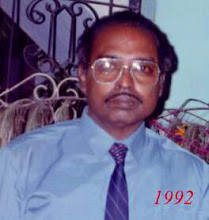The Lonely Lamp
By Puthumai Pithan[1947]
[Translated from Tamil by R. Paul Mohan Roy, Journal of South Asian Literature (East Lansing, MI) 13, nos.1-4 1977-1978 211-212]
There at the corner of the lane stands a street lamp. Fixed on a stone pillar, it feeds on a mixture of oil and kerosene. It is being maintained by the village panchyat. Dutifully enough, it dispels darkness in the nights. It will burn till the last drop of oil lasts, usually till 3 in the morning.
Birth and death are not meant for living beings alone; their domain extends to things inanimate as well. On its short journey on earth, the lamp now has reached its last stage, readying itself to join hands with the dead.
The stone pillar dons a slant Pisa-like look; the square shaped glass cover, one day, becomes a victim to an errant boy’s target shooting with his catapult. Is the boy aware of the lamp’s service? Does he know how it would have felt being stoned?
The wind begins to blow, throwing up all dead leaves on the face of the lamp. It causes the flame to tremble. Does the wind know the lamp gives a glimpse of light to the passersby? The wind becomes damp and cold. It brings little drops of rain that tries to snuff out the flame. On cold nights without its glass cover, shaken by the wind, the lamp plays dice with death. The wind and the raindrops, it looks, are out to extinguish the flickering lamp. They are simple instrument in the process of change.
The lamp has a friend, an old beggar in tattered clothes, for friendship ferments among people of equal age and status. To the old man, the lamp is the resting place, the only comfort and luxury he can count upon. Often they are seen together, inseparably bonded by thin threads of friendship. Once in their youth they are proud of being respected; now it is an old story. Everything in their lives, joy or sorrow, is the same. The youthful look fading out every day, age has brought irreversible marks on them. And they now wait for the inevitable entry into the oblivion.
How does the old man know they have decided to knock down the stone pillar and remove the oil lamp? How does he know they are going to erect a new kind of lamp post?
Next evening a man comes with a spade and crowbar. He uproots the stone pillar, breaks it to little blocks and takes them away, leaving no trace of a lamp having ever stood there.
The old man feels the loss of someone close to him. The staff he is carrying all these days is broken at the middle of his life’s journey, he feels. Darkness comprehends. There is no stone pillar to lean upon and rest. With no light to trace what little cherished things he has heaped there, he begins to feel his growing blindness. Without his ‘friend’ life seems meaningless and empty, a long stretch of happenings of which he has little control.
Peace to the old man?
Where from he would expect? The broken lamp on the stone pillar, the comfort his last days is dismantled and taken away. Next day the old man is found lying on the place where the lamp once stood, motionless. They say he is dead.
Now there stands a new lamp pegged to a wooden post. Unlike the old one of the past, it burns bright all night. And it gives more light. They say it works on electric power. Under the dazzling light of the new lamp, children play merrily and waltz round. The oil lamp and the man who lived underneath are left buried on time’s remote grave. Do they know they too will, one day, wither and be vanished in the minds of the present?
The electric power, in future, may be replaced by solar power, or perhaps, who knows, maybe by atomic power. The children do not know; as they play hide and seek or read under the new lamp they know only the present. The old will die and disappear from their eyes.

No comments:
Post a Comment